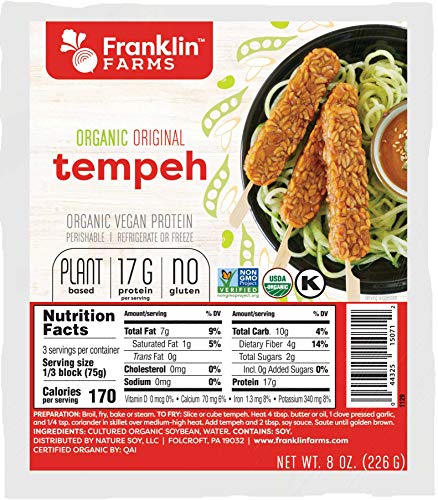Tempeh, a traditional Indonesian food made from fermented soybeans, is gaining popularity as a healthy and versatile plant-based protein source. However, many people are unsure whether tempeh needs to be refrigerated or if it can be stored at room temperature.
To answer this question, it is important to understand how tempeh is made. The fermentation process involved in making tempeh creates a rich environment for beneficial bacteria and yeasts to grow. These microorganisms help to break down the soybeans and make them more digestible. However, they also make tempeh a perishable food that can spoil if not stored properly.
While tempeh can be stored at room temperature for a short period of time, it is recommended to refrigerate it to extend its shelf life. Refrigeration helps to slow down the growth of bacteria and yeasts, thereby preventing spoilage. By keeping tempeh in the refrigerator, you can ensure that it stays fresh and safe to eat for longer.
In conclusion, while tempeh can be stored at room temperature for a short duration, it is advisable to refrigerate it to maintain its freshness and prevent spoilage. So, next time you buy tempeh, make sure to keep it refrigerated to enjoy its nutritional benefits for an extended period of time.
Can Tempeh Be Stored at Room Temperature?
Tempeh is a fermented soybean product that is commonly used as a meat substitute in vegetarian and vegan diets. While it is important to refrigerate tempeh after opening to ensure its freshness and prolong its shelf life, unopened tempeh can be safely stored at room temperature.
Tempeh is a unique product because it undergoes a fermentation process during production. This fermentation process helps to preserve the tempeh and gives it a distinctive flavor and texture. As a result, unopened tempeh can be stored at room temperature without the need for refrigeration.
However, it is important to note that once tempeh is opened, it should be stored in the refrigerator to prevent spoilage. The cold temperature of the refrigerator slows down the growth of bacteria and other microorganisms, helping to preserve the quality and freshness of the tempeh.
When storing tempeh in the refrigerator, it is best to place it in an airtight container or wrap it tightly in plastic wrap to prevent it from drying out or absorbing other odors. Properly stored tempeh can last for up to a week in the refrigerator.
In conclusion, while unopened tempeh can be stored at room temperature, it is important to refrigerate it once opened to maintain its freshness. By properly storing tempeh, you can enjoy its unique flavor and texture for an extended period of time.
The Shelf Life of Refrigerated Tempeh
Refrigerating tempeh is essential to maintain its freshness and extend its shelf life. When stored properly in the refrigerator, tempeh can last for several weeks, making it a convenient option for meal planning and prepping.
On average, refrigerated tempeh can last anywhere from 2 to 4 weeks. However, it is important to check the expiration date on the packaging and consume it before that date to ensure its quality and taste. Additionally, keep in mind that the longer tempeh is stored, the firmer and more pungent it may become.
To properly store tempeh in the refrigerator, remove it from its original packaging and place it in an airtight container or wrap it tightly in plastic wrap. This will help prevent moisture loss and potential contamination from other fridge odors. It is also recommended to label the container with the date of purchase to easily track its freshness.
When using refrigerated tempeh, always inspect it visually and check for any signs of spoilage such as mold, unusual texture, or off-putting smell. If any of these signs are present, it is best to discard the tempeh to avoid any risk of foodborne illnesses.
Furthermore, if you are unable to consume the entire package of tempeh at once, you can freeze the remaining portion. Freezing tempeh can further extend its shelf life for up to 3 months. To freeze tempeh, wrap it tightly in plastic wrap or place it in a freezer-safe container. When ready to use, thaw the tempeh in the refrigerator overnight and proceed with your preferred cooking method.
In summary, refrigerating tempeh is necessary to maintain its freshness and quality. With proper storage techniques, refrigerated tempeh can last for a few weeks, providing you with a versatile and nutritious ingredient for your meals.
What Happens if Tempeh is Not Refrigerated?
If tempeh is not refrigerated, it can spoil and develop harmful bacteria. Proper refrigeration is essential to ensure the safety and quality of tempeh.
Bacterial Growth
When tempeh is not refrigerated, it creates an environment that allows bacterial growth. The warm temperature allows bacteria to multiply rapidly, increasing the risk of foodborne illnesses.
Foodborne Illnesses
Tempeh that is not refrigerated can contain harmful bacteria such as Salmonella, E. coli, and Listeria. These bacteria can cause foodborne illnesses, resulting in symptoms like diarrhea, nausea, vomiting, and abdominal pain.
Spoilage
Without refrigeration, tempeh can spoil quickly. Spoiled tempeh may have an unpleasant smell, off taste, or visible signs of mold. Consuming spoiled tempeh can lead to food poisoning.
Deterioration of Quality
Tempeh that is not stored properly can also deteriorate in quality. It can become dry, tough, and lose its flavor and texture. Refrigeration helps maintain the freshness and taste of tempeh.
To ensure the safety and quality of tempeh, it is recommended to store it in the refrigerator at all times, even if it is unopened. If you are unsure about the freshness or safety of tempeh, it is best to discard it to avoid any potential risks.
How to Properly Store Tempeh
To ensure the freshness and quality of tempeh, it’s important to store it properly. Follow these guidelines to store tempeh safely:
1. Refrigeration: Tempeh needs to be refrigerated to maintain its freshness. As soon as you bring it home from the store, transfer it to the refrigerator and store it between 34°F and 38°F (1°C to 3°C).
2. Packaging: Keep tempeh in its original packaging or transfer it to an airtight container or resealable bag. This will prevent moisture and odors from affecting its flavor and texture.
3. Avoid exposing to air: Tempeh can easily absorb odors from the surroundings. Store it away from strong-smelling foods like onions, garlic, or spices.
4. Shelf life: Check the expiry date on the packaging and consume tempeh before it expires. Generally, tempeh stays fresh for about one week in the refrigerator, but it’s best to consume it within three to four days for optimal quality.
5. Freezing: If you have a large amount of tempeh or won’t be able to consume it within the recommended time, you can freeze it. Wrap tempeh tightly in plastic wrap or place it in a freezer bag before freezing. Frozen tempeh can be stored for up to three months. Thaw it in the refrigerator before use.
By following these storage guidelines, you can ensure that your tempeh remains fresh, delicious, and safe to eat.
The Best Way to Extend the Shelf Life of Tempeh
Tempeh is a nutritious and versatile food made from fermented soybeans. It is a popular choice for vegetarians and vegans due to its high protein content. However, like any perishable food, tempeh can spoil if not stored properly. To extend its shelf life and maintain its quality, it is important to follow these guidelines:
1. Refrigerate promptly: After purchasing or making tempeh, it should be refrigerated immediately. The cold temperature helps slow down the growth of bacteria and other microorganisms.
2. Store in an airtight container: Place the tempeh in an airtight container or wrap it tightly in plastic wrap. This will help prevent moisture and odors from affecting the tempeh.
3. Keep away from strong-smelling foods: Tempeh has a porous texture and can easily absorb odors from other foods. It is important to store tempeh separately from strong-smelling foods like onions, garlic, and certain spices.
4. Check for signs of spoilage: Before consuming tempeh, always check for signs of spoilage. This includes a slimy or off-smelling texture, mold growth, or discoloration. If any of these signs are present, it is best to discard the tempeh.
5. Freeze for long-term storage: If you have extra tempeh that you are not planning to use within a few days, it can be frozen for longer shelf life. Wrap individual portions tightly in plastic wrap or place them in a freezer bag. Frozen tempeh can last for several months.
6. Thaw properly: When you are ready to use frozen tempeh, thaw it in the refrigerator overnight. Avoid thawing at room temperature, as this can promote bacterial growth.
By following these guidelines, you can extend the shelf life of tempeh and enjoy its nutritional benefits for longer periods.
FAQ
Does tempeh need to be refrigerated?
Yes, tempeh needs to be refrigerated. It is a fermented soy-based product that can spoil easily if not stored in a cool environment. Keeping tempeh in the refrigerator helps to maintain its freshness and prevent the growth of harmful bacteria.
What happens if tempeh is not refrigerated?
If tempeh is not refrigerated, it can spoil quickly. The warm temperature encourages the growth of bacteria, which can cause the tempeh to develop an off smell, change in texture, or become slimy. Eating spoiled tempeh can lead to food poisoning and other health issues.
Can I leave tempeh out overnight?
It is not recommended to leave tempeh out overnight. Tempeh should be refrigerated to keep it fresh and safe to consume. Leaving tempeh out at room temperature for an extended period can lead to bacterial growth and spoilage. It is best to store tempeh in the refrigerator to maintain its quality.







